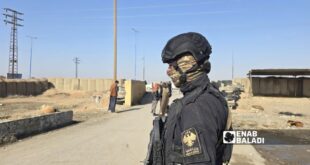JERUSALEM (Feb. 10) – Palestinian leaders fanned out across the world Saturday in a diplomatic blitz aimed at convincing reticent world leaders to support their hard-won power-sharing deal by lifting economic sanctions on their government.
The envoys may have a hard sell.
Western governments and Israel have given only muted reactions to the agreement signed Thursday by Hamas and Fatah leaders in the holy Saudi city of Mecca. International leaders said they would have to first study the deal and see how it changes the situation on the ground, dashing hopes for a quick end to the sanctions.
The Quartet of Mideast mediators – the U.S., the U.N., Russia and the European Union – had demanded that the militant Hamas group, which won Palestinian parliamentary elections last year, recognize Israel’s right to exist, renounce violence and accept past peace deals.
The Mecca deal says only that the new government pledges to “respect” the previous deals. It makes no reference to recognizing Israel or renouncing violence and appears to fall short of the Quartet’s demands.
Palestinian President Mahmoud Abbas, a moderate Fatah leader who pushed for a deal for months, is hoping that personal diplomacy with every member of the Quartet will build momentum for his cause to end the embargo imposed on the Palestinian Authority after Hamas’ election.
The embargo has frozen roughly $1 billion in annual foreign aid and about $500 million in tax revenues Israel collects on behalf of the Palestinians, crippling the Palestinian government’s ability to function.
“We are trying to market the (Mecca) agreement and get international support for it,” Abbas aide Nabil Amr said Saturday.
Abbas is sending Amr to Germany, which holds the rotating presidency of the EU, for talks on the agreement. Amr will then head to Belgium to meet with Javier Solana, the EU’s chief foreign policy envoy, Amr said.
“We urge the officials in Europe to exert efforts to lift the siege imposed on the government,” he said.
Abbas, who has held rounds of telephone talks with Arab leaders in recent days to try to rally them to his side, will meet with Russian President Vladimir Putin in Jordan on Monday, Amr said. Abbas also plans to head to Egypt for talks before returning to the West Bank.
On Friday, soon after the deal was reached, Abbas aides Saeb Erekat and Yasser Abed Rabbo met with Secretary of State Condoleezza Rice in Washington before heading to New York for a meeting with U.N. Secretary-General Ban Ki-moon.
Abed Rabbo said Rice told him the agreement was unclear on key issues and she was skeptical Hamas would abide by it, but she would wait to see how it was carried out on the ground. America wanted the new government to stop Gaza militants from launching rockets at Israel, prevent other attacks and respect previously signed agreements, he said.
“The Americans are worried that Hamas will not succeed in this test,” he said.
Some analysts said the United States was waiting for Israel to decide how to react to the agreement before it would decide what to do. Israel said it would not have an official response until its weekly Cabinet meeting Sunday.
Israeli Deputy Prime Minister Avigdor Lieberman, of the hard-line Yisrael Beiteinu party, told the German weekly Der Spiegel that he feared Hamas could be rewarded for the agreement, even though it did not give in to the international demands to moderate itself.
“I am worried that a Palestinian government of national unity will give Hamas the international legitimacy that it so far has lacked – without it recognizing Israel or ending the tactics of terror against us,” he was quoted as saying in an interview published Saturday.
Hamas, listed as a terror group by Israel, the United States and the EU, is responsible for scores of deadly suicide bombings in Israel.
Previous efforts to form a national unity government have foundered, though none have ever come this far. Still, there were fears that the new deal could unravel in coming weeks as the two sides choose ministers for the government.
Though Prime Minister Ismail Haniyeh, of Hamas, has five weeks to put together a Cabinet, Abbas wants him to finish the job as soon as possible, hopefully within a week, Amr said.
“There are not a lot of issues to discuss because the main issues were agreed to in Mecca,” he said.
It was also not clear whether Hamas and Fatah militants, whose running street battles in Gaza have killed over 130 people since May, will abide by the deal.
 Eurasia Press & News
Eurasia Press & News



